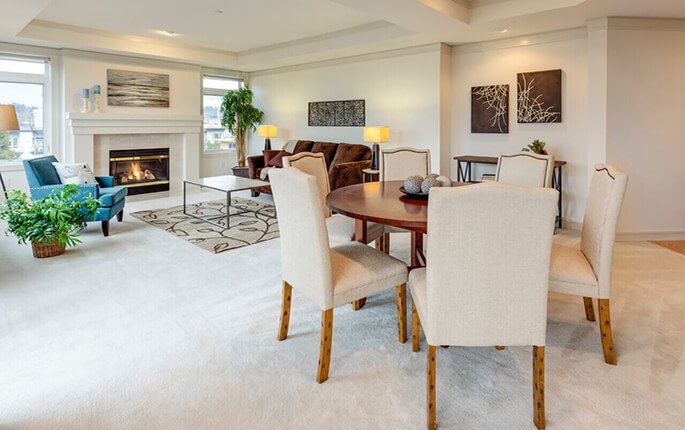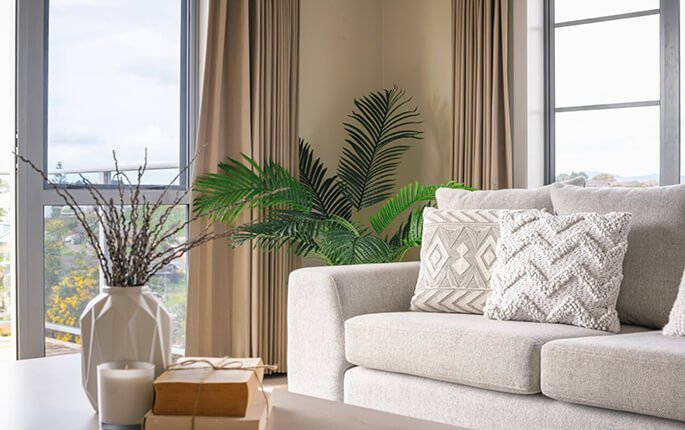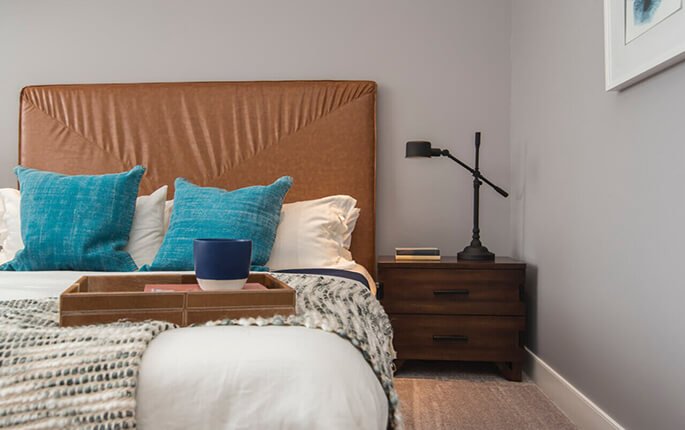
Admin Devayoni 3 Comments 628 Views
A Comprehensive Guide to Choosing the Perfect Paint for Your Room
Choosing the right paint color for your room is essential to create the desired ambiance and reflect your style.
Choosing the right paint for your room can greatly enhance its overall look and feel. The color, type of paint, and finish you select can impact the mood, atmosphere, and even the perceived size of the space. In this comprehensive guide, we will explore the basics of paint selection, assess the factors influencing paint choices, delve into the different paint finishes available, and discuss additional factors to consider. By the end of this guide, you will have all the information you need to confidently select the perfect paint for your room.
I. Understanding the Basics of Paint Selection
When it comes to choosing the right paint for your room, it's important to consider the impact of color, the different types of paints available, and how they can complement different room types.
A. Importance of Choosing the Right Paint Color
The color of your paint can have a significant impact on the mood, atmosphere, and overall aesthetic of your room.
1. Impact on Mood and Atmosphere
Colors have the power to evoke emotions and create specific moods. Warm colors like red and orange can create a cozy and energetic atmosphere, while cool colors like blue and green promote calmness and relaxation.
2. Reflection of Personal Style
Paint colors are an opportunity to express your personal style and taste. Whether you prefer bold and vibrant shades or soft and subtle hues, your paint color choice can reflect your personality.
3. Enhancing Visual Perception of Space
Carefully chosen paint colors can either expand or shrink the perceived size of a room. Lighter colors can make a small room appear larger, while darker colors create a sense of coziness in larger spaces.
B. Types of Paints Available
Understanding the different types of paints available will help you choose the one that suits your needs.
1. Emulsion Paints
Emulsion paints, also known as latex or water-based paints, are the most popular choice for interior walls. They are quick-drying, have low odor, and are easy to clean up with water. Emulsion paints come in various finishes, from matte to high-gloss.
2. Oil-based Paints
Oil-based paints are known for their durability and smooth finish. They are ideal for areas with high traffic and are resistant to stains and moisture. However, they have a strong odor and require paint thinners for cleanup.
3. Gloss or Satin Finish Paints
Gloss and satin finish paints are often used for trims, doors, and cabinets. Gloss finishes offer a high sheen and are highly durable, while satin finishes provide a softer shine.
C. Considerations for Different Room Types
Different rooms have different requirements when it comes to paint selection. Let's explore the considerations for the most common room types.
1. Bedrooms
Bedrooms are a space for rest and relaxation, so it's best to choose calming and soothing colors. Light pastels, cool blues, or earthy neutrals work well in creating a tranquil environment.
2. Living Rooms
Living rooms are where most of our socializing happens. Warm and inviting colors like soft yellows, warm grays, or muted greens can create a comfortable and welcoming atmosphere.
3. Kitchens and Bathrooms
Kitchens and bathrooms require paint that can withstand moisture and frequent cleaning. Opt for moisture-resistant paints with a semi-gloss or high-gloss finish to ensure longevity and easy maintenance.
II. Assessing the Factors Influencing Paint Selection
Several factors, such as natural lighting, room size, proportions, and color schemes, play a role in determining the perfect paint for your room.
A. Evaluating Natural Lighting
The amount and direction of natural light in a room can greatly affect the appearance of paint colors.
1. Effect on Paint Colors
Rooms with ample natural light can showcase colors as they truly appear, while rooms with limited natural light may make colors appear darker or duller. Consider how the paint color will look in both natural and artificial lighting.
2. Maximizing or Minimizing Natural Light
If you want to maximize natural light, choose lighter shades of paint and consider using mirrors or light-colored furniture. On the other hand, if you wish to minimize natural light, darker shades can create a cozy and intimate ambiance.
B. Analyzing Room Size and Proportions
The size and proportions of a room can influence the choice of paint color and finish.
1. Enhancing or Diminishing Space Perception
Lighter colors can make a small room appear larger, while darker colors can create a more intimate and cozy atmosphere in larger rooms.
2. Understanding Ceiling Height Considerations
To visually lower a high ceiling, choose a darker shade for the ceiling. Conversely, if you want to make a low ceiling appear higher, consider painting it with a lighter color.
C. Determining Color Schemes
Color schemes play a vital role in creating a harmonious and visually appealing space. Consider these color scheme options:
1. Complementary Colors
Complementary colors are opposite each other on the color wheel, such as blue and orange or red and green. Using complementary colors can create a vibrant and dynamic color scheme.
2. Monochromatic or Analogous Color Schemes
Monochromatic color schemes involve using different shades and tints of a single color, while analogous color schemes involve using colors that are next to each other on the color wheel. Both options create a cohesive and harmonious look.
3. The Impact of Neutral Colors
Neutral colors like white, beige, and gray are versatile and timeless. They can serve as a backdrop for other elements in the room and provide a sense of balance and tranquility.
III. Choosing the Right Paint Finish
The finish of your paint can affect both the aesthetic appeal and the practicality of the room. Let's explore the different paint finishes available.
A. Understanding Different Paint Finishes
Different paint finishes offer varied levels of sheen and durability.
1. Matte or Flat Finish
Matte finishes have no sheen and are perfect for hiding imperfections on the wall surface. They provide a smooth and velvety appearance but can be less durable and more prone to stains.
2. Eggshell Finish
Eggshell finishes have a slight sheen, offering a more washable surface compared to matte finishes. They strike a balance between durability and minimal reflection of light.
3. Satin Finish
Satin finishes provide a soft sheen and are easier to clean than matte or eggshell finishes. They are ideal for high-traffic areas like hallways, kitchens, or children's rooms.
4. Semi-Gloss Finish
Semi-gloss finishes offer a noticeable sheen and high durability. They are resistant to moisture, making them a suitable choice for bathrooms, kitchens, and trim areas.
B. Considering Practicalities and Maintenance
Choosing a paint finish that suits your lifestyle and the room's specific needs is crucial.
1. Stain Resistance
If you anticipate potential stains or spills in the room, opting for a higher sheen finish like satin or semi-gloss can make cleaning easier.
2. Durability and Scrubability
Consider the room's usage and the level of wear and tear it may experience. High-traffic areas benefit from durable finishes that can withstand regular scrubbing and cleaning.
3. Water and Moisture Resistance
In rooms with high humidity or moisture, like bathrooms and kitchens, choosing a paint finish specifically designed for water resistance will help prevent damage and extend the lifespan of the paint.
C. Matching the Finish to the Room
Choosing the right finish for each room is essential in achieving the desired aesthetic and practicality.
1. Ideal Finishes for High-Traffic Areas
High-traffic areas like hallways, entryways, and kitchens benefit from finishes that can withstand frequent cleaning and wear. Satin or semi-gloss finishes are excellent options in these cases.
2. Choosing Finishes Based on Aesthetic Goals
Consider the overall style and look you desire for each room. Matte or eggshell finishes add depth and sophistication to formal spaces, while glossier finishes can provide a touch of elegance or modernity.
IV. Exploring Additional Factors for Consideration
In addition to color, finish, and practical considerations, there are other factors to keep in mind when selecting paint for your room.
A. Sustainable and Environmentally Friendly Paint Options
If you are conscious of the environmental impact of your choices, there are several sustainable and eco-friendly paint options available.
1. Low or Zero VOC Paints
Volatile Organic Compounds (VOCs) are harmful chemicals found in many paint products. Opting for low or zero VOC paints ensures better indoor air quality and reduces environmental harm.
2. Natural and Organic Paints
Natural and organic paints are made from plant-based or mineral ingredients. They are non-toxic, eco-friendly, and provide a safer alternative for those with sensitivities or allergies.
3. Paint Recycling and Disposal
Consider the environmental impact of paint disposal. Look for paint recycling programs in your area or inquire about safe disposal methods to minimize harm to the environment.
B. Budgetary Considerations
When selecting paint, it's important to consider your budget and balance cost with longevity.
1. Evaluating Prices and Quality
Compare prices of different paint brands and consider the quality offered. Cheap paints may require more coats and could have a shorter lifespan, while higher-quality paints may require fewer coats and provide better coverage.
2. Balancing Cost with Longevity
Investing in quality paint can save money in the long run, as it tends to last longer and requires less maintenance. Consider the cost of repainting versus the cost of purchasing higher-quality paint.
C. Seeking Professional Advice
When in doubt, seek the guidance of professionals who specialize in paint selection, such as paint specialists or interior designers.
1. Consulting Paint Specialists or Interior Designers
Paint specialists and interior designers have extensive knowledge and experience in selecting the right paint for various spaces. They can provide valuable insights and recommendations based on your specific needs and preferences.
2. Utilizing Digital Tools for Paint Visualization
Many paint companies offer digital tools that allow you to visualize how different paint colors will look in your room. These tools can help you make more informed decisions and save you from any surprises.





3 Comments
Morni morkel
21 Sep 2021Lorem ipsum dolor sit amet, qui assum oblique praesent te. Quo ei erant essent scaevola, est ut clita dolorem, ei est mazim fuisset scribentur
Darren shammi
28 Sep 2021Lorem ipsum dolor sit amet, qui assum oblique praesent te. Quo ei erant essent scaevola, est ut clita dolorem, ei est mazim fuisset scribentur
John Doe
24 Feb 2022Lorem ipsum dolor sit amet, qui assum oblique praesent te. Quo ei erant essent scaevola, est ut clita dolorem, ei est mazim fuisset scribentur
Submit a Comment